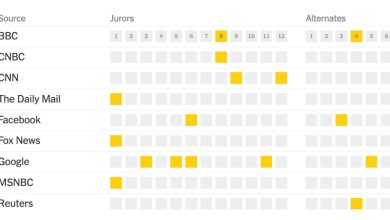What Australia’s Success at the Winter Olympics Does (and Doesn’t) Tell You

The Australia Letter is a weekly newsletter from our Australia bureau. Sign up to get it by email. This week’s issue is written by Manan Luthra, an intern with the Australia bureau.
On Sunday, the 2022 Winter Olympics will conclude. For Team Australia, its medal tally is small but significant. It has won four as of Friday, its most ever in the Winter Games, putting Australia 17th on the medals table, six spots higher than its final position in 2018. The haul includes a number of firsts for the country. Jakara Anthony’s gold in women’s moguls, Jaclyn Narracott’s silver in women’s skeleton, and Tess Coady’s bronze in women’s slopestyle are the first Olympic medals Australia has won in those disciplines.
Watching all the Australians medal during a warm Sydney summer was both jarring and exciting. Our country is usually obsessed with sports that lend themselves to our warmer weather — cricket, tennis, swimming. Is that changing? Could Australia actually become more of a snow sport country? At the Olympics and just in general?
The Australian Olympic team’s campaign began on fertile ground. Even before the 44-member contingent left for China, news of the competitors’ strong individual 2021 seasons and record-high female representation garnered local excitement, as did the Olympic debut of the curling and monobob teams. By the fourth day of the Games, Jakara Anthony and Tess Coady had won their two medals, giving Australia its best start in a Winter Olympics. A silver medal in the men’s halfpipe event, won five days later by Scotty James, drew Australia even with its previous best Winter Olympics performance. Narracott’s silver medal then pushed the delegation into unfamiliarly successful territory.
Three other Australians fell just short of adding to the medal haul: Belle Brockhoff finished fourth in snowboarding,Bree Walker ended up fifth in bobsled, andLaura Peel also finished fifth, in aerial skiing.
All of those victories and close performances played out before huge audiences back home, on television at least. Seven West Media, Australia’s official broadcaster of the Games, was the most-watched free-to-air network for the event’s first week; during that time, over 500,000 households watched Olympic coverage every day. And it wasn’t just television crowds who were getting in on the action. Watch parties organized by Snow Australia brought former athletes and winter sports enthusiasts together to enjoy the Games.

Explore the Games
- Under Scrutiny: As Russian athletes score more wins, present and past doping scandals, as well as the situation in Ukraine, are casting a shadow over their triumphs.
- Caught in the Middle: American athletes of Chinese descent in Beijing have become targets of patriotic sentiment, both adoring and hostile, from both China and the U.S.
- An Ice-Suit Clad Panda: The search for souvenirs of the Olympic mascot, Bing Dwen Dwen, in Beijing involves long lines and eye-popping price tags.
- The Quest for Good Food: Hungry athletes, officials, volunteers and journalists have been trying, with effort and persistence, to find moments of delicious culinary diversion, however small.
But what does all this mean for Australian snow sports?
On an international level, Australia’s accomplishments have led to recognition that its winter athletes are world-class. Snow Australia’s chief executive, Michael Kennedy, told me that Australia’s victories made “the world stand up and take notice. Because our success was across so many events, particularly in the first four days of the Olympics, the world respected — and does respect — Australia as a winter sport nation.”
Closer to home, though, the recognition is a little more limited. Geoff Lipshut, the top official for Australia’s Olympic teams in China, said that winter sports aren’t something Australians “do a lot of.” Sure, Olympic events increase interest in them, but their time in the public consciousness is short-lived after the Games conclude. Apart from Steven Bradbury, who famously won a gold medal in speedskating 20 years ago because all the competitors in front of him fell down, it’s difficult for most Australians to easily name a major moment inwinter sports history.
My attempts to contact someone who had been actively watching the Games were unsuccessful — some had skimmed headlines or glanced at highlights, but no one watched more events than they did during the Summer Games last year.
What, then, is required to lift the profile of snow sports in Australia? If putting more of Australia’s winter athletes on television is the answer, there isn’t much time left. Australia will compete in only three more events before the Games end: the two-woman bobsled, men’s 50-kilometer freestyle skiing and women’s 30-kilometer freestyle skiing.
If the answer lies in getting more Australians to learn how to ski, they best act quickly, at least if they want to start this year. Kennedy said that general managers of Australian ski resorts are reporting a spike in interest, three and a half months before the country’s winter season starts, though it’s hard to tell if that has more to do with the easing of pandemic travel restrictions or the Olympics.
Ultimately, watching this year’s Games was a strange experience for me. Most of the time, I had no idea what was going on; my basic knowledge of snow sports, predominantly based on movies like “Cool Runnings” and a disastrous skiing vacation in 2012, probably didn’t help. But seeing the breadth of Australian talent turning, halfpiping, and moguling was fascinating. Why are these athletes, and the events they compete in, so easily forgotten in Australia? Why is the country’s legacy across all snow sports pinned to Steven Bradbury, whose success has been considered a fluke, a bit of good luck?
If you have ideas for how to help snow sports gain more recognition in Australia, write to us at [email protected].
Now for the stories of the week:
Australia and New Zealand
-
Rosalie Kunoth-Monks, Champion of Indigenous Peoples, Dies at 85. As a teenager, she was the star of a film about an Aboriginal girl raised by a white family. As an adult, she fought discrimination in Australia against her people.
-
Australia gives a green light to Moderna’s coronavirus vaccine for children ages 6 to 11.The country is the first to grant provisional authority for the Moderna vaccine to be used in children younger than 12.
-
Shark Kills Swimmer in Rare Death Off Sydney Coast. The fatal shark bite occurred on Wednesday near Little Bay. Mayor Dylan Parker of Randwick City, Australia, said, “To lose someone to a shark attack like this is chilling.”
-
New Zealand Anti-Vaccine Mandate Protesters Undeterred by Loud Music. Officials blasted a playlist of polarizing hits in an attempt to disperse approximately 3,000 demonstrators who were camped in front of Parliament. Many responded by dancing and singing.
-
A Pandemic Plan Boomerangs, So It’s Back to Hell’s Kitchen. When the pandemic began, Jan Riley wanted to return to Australia, but she was no match for the country’s health restrictions. She ended up where she started.
-
A remote island nation confronts its first confirmed coronavirus case.The case in the Cook Islands emerged a month after the country reopened its air borders to travelers from New Zealand.
-
Blinken Says U.S. Has a ‘Long-Term Future’ in the Pacific Islands. The secretary of state promised a new embassy in the Solomon Islands and help on issues like climate change, as Washington vies with Beijing for influence in the region.
-
Australia Declares Koalas an Endangered Species. Years of drought, fires and habitat loss have drastically reduced the population of the iconic marsupial.
Around the Times
-
As Russian Wins Mount, So Does the Scrutiny. The fallout from a doping scandal at the 2014 Sochi Games and a troop buildup on the Ukrainian border have kept Russia, and its athletes, under a microscope.
-
Spotify Bet Big on Joe Rogan. It Got More Than It Counted On.The deal that brought his podcast to Spotify is said to be worth over $200 million, more than was previously known. Accusations that he spreads misinformation have roiled the company.
-
How a Secret Assault Allegation Against an Anchor Upended CNN and Jeff Zucker.The network’s top-rated host and its president were forced out following ethical lapses, an office romance and a letter from a lawyer for “Jane Doe.”
-
In Orlando, 25 Mysterious Basquiats Come Under the Magnifying Glass. Vibrant paintings on cardboard said to be by the artist were found in the storage unit of a Hollywood screenwriter. Will a museum show resolve questions about their authenticity — or raise new ones?
Enjoying the Australia Letter? Sign up here or forward to a friend.
For more Australia coverage and discussion, start your day with your local Morning Briefing and join us in our Facebook group.




